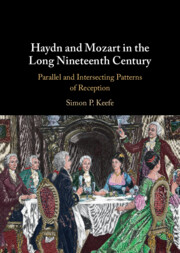Book contents
- Haydn and Mozart in the Long Nineteenth Century
- Haydn and Mozart in the Long Nineteenth Century
- Copyright page
- Dedication
- Contents
- Acknowledgements
- Abbreviations
- Introduction
- Chapter 1 Papa and the Matador, Alive and Dead
- Chapter 2 Biographical and Critical Narratives and Perspectives, 1811–1830
- Chapter 3 Anniversaries, Commemorations, Writings
- Chapter 4 Scholarship and Fiction in the Late Nineteenth Century, 1861–1890
- Chapter 5 Anniversaries in Context, 1891–1914
- Epilogue
- Select Bibliography
- Index
Introduction
Published online by Cambridge University Press: 08 August 2023
- Haydn and Mozart in the Long Nineteenth Century
- Haydn and Mozart in the Long Nineteenth Century
- Copyright page
- Dedication
- Contents
- Acknowledgements
- Abbreviations
- Introduction
- Chapter 1 Papa and the Matador, Alive and Dead
- Chapter 2 Biographical and Critical Narratives and Perspectives, 1811–1830
- Chapter 3 Anniversaries, Commemorations, Writings
- Chapter 4 Scholarship and Fiction in the Late Nineteenth Century, 1861–1890
- Chapter 5 Anniversaries in Context, 1891–1914
- Epilogue
- Select Bibliography
- Index
Summary
Basic information about Haydn and Mozart’s relationship was readily available to interested parties in the long nineteenth century. In his memoirs (1826), the singer and creator of Don Basilio and Don Curzio at the premiere of Le nozze di Figaro, Michael Kelly, reported them playing string quartets together in 1784 – with Carl Ditters von Dittersdorf and Jan Vaňhal on second violin and cello – for a small gathering that included composer Giovanni Paisiello and poet and librettist Giovanni Battista Casti as well as Kelly himself. After the ‘musical feast’, moreover, the atmosphere was most convivial: ‘we sat down to an excellent supper, and became joyous and lively in the extreme’.1 Mozart documented a rendition of his newly completed set of string quartets with Haydn when dedicating them to his compositional elder and ‘very dear friend’ in Viennese publisher Artaria’s first edition of September 1785.2 And Haydn reciprocated Mozart’s admiration in famously stating to Mozart’s father Leopold, who was present at a read-through of the last three quartets of the set on 12 February 1785: ‘Before God and as an honest man I tell you that your son is the greatest composer known to me either in person or by name. He has taste and, more than that, the greatest compositional knowledge.’
- Type
- Chapter
- Information
- Haydn and Mozart in the Long Nineteenth CenturyParallel and Intersecting Patterns of Reception, pp. 1 - 13Publisher: Cambridge University PressPrint publication year: 2023

